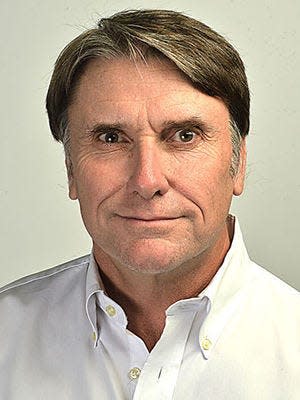Maybe it wasn't the wisest choice going with the cheapest funeral home in town
Let this be a lesson for everyone: If you’re shopping for cremation services and you see a price that’s too good to be true, it probably is.
I’ll explain why in a moment, but really? Do people actually shop around for the best price on the processing of their dead loved-ones’ remains? Do crematoriums have fire sales? I suppose it’s quite possible, it’s just not something I had ever stopped to think about is all.
It’s not out in the open, that’s for sure. Funeral homes don’t make a habit of advertising "the lowest price in the Tri-State area," and I’d be very wary of any crematorium that was having a BOGO promotion.

It also seems slightly disrespectful — Auntie Em is lying there in cold storage and you’re on the horn trying to get a few bucks shaved off the barrelhead like she’s a load of soybeans or something.
More Tim:Just because it's packaged in a familiar brand name doesn't mean the old folks will buy it
But no matter, that’s not the point. The point is much worse. That’s because, according to press accounts, a Colorado funeral home director has pleaded guilty to selling parts off of corpses to medical research facilities without — well, you can’t say the owner’s consent obviously, but the family’s consent, which is just about as bad.
Newspapers say Megan Hess, with help from her mother, Shirley Koch, did hundreds of thousands of dollars worth of illegal business, which allowed her to get even more cadavers because she did indeed have the lowest price in town, subsidized by elicit activity.
According to the Grand Junction Daily Sentinel, “Hess and Koch are accused of setting up Sunset Mesa Funeral Directors in Montrose as a nonprofit, selling hundreds of bodies for research from 2010 to 2018, even if the person or family’s wishes were for cremation.”
Pete WatersDoes wisdom really arrive at the end?
Yikes. And “Sunset Mesa” is such a nice name, too. And a family business, to boot. That had to be rich. “Mom, do we have any more elbows? Harvard Med needs elbows.” To me it’s more respectful to think that our last act would be to do some good in this world instead of sitting in the bottom of an urn for all time. But at a time like this, you do what the family wants, and many families will consider the ashes to be sacred.
The New York Times, however, wrote, “on hundreds of occasions the funeral home operators would sell heads, torsos, arms, legs or entire human bodies. Frequently, they delivered cremated remains to families with the suggestion they were the remains of their relative when, in fact, they were not.”
How do you sell a torso? Never mind. What I’ve always wondered long before this is how you would ever know that your loved one’s ashes are genuine. They give you back what could just as easily be a couple of scoops from a bag of Sakrete and we trustingly place it on the mantle and go on with life until we take our place on someone else’s mantle.
Bob ParasilitiSports participation not only about how you play the game
Gramps can tell you that his final wish is to have his ashes sprinkled in Rocky Mountain National Park, and when it comes time, you could be reverently sprinkling the ashes of the Denver Post sports section for all you know.
People forget, but cremation didn’t become mainstream in this country until the 1970s, after the last of the major religions gave up their objections. Then, it seemed like every sitcom on the air had an obligatory cremation episode that involved the ashes getting lost at the airport or accidentally flushed.
There was even an Irish show based on the antics of Charlie Burn, owner of C.U. Burn crematorium services where, for example, a body intended for burial is accidentally cremated. Hilarious. Although I bet that’s happened — the family makes a note that they want him buried in a cream suit, and …
Tim Rowland is a Herald-Mail columnist.
This article originally appeared on The Herald-Mail: Crematorium owner's guilty plea to selling body parts sparks concerns
